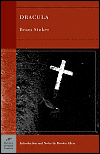Dracula

I read most of Dracula in college for an awesome class in Gothic literature, but it was near the end of the semester and I wasn't able to finish it. Since it's been several years, I decided to go ahead and reread this one as part of my League project, especially since Mina Harker is such an important character in the League books. In the movie, Allan Quartermain (Sean Connery) is the "leader" of the group, but in the GNs, it is Mina who takes the lead.
This alone is fascinating, after reading Dracula. The (male) heroes of Dracula - Van Helsing, Mina's husband Jonathan, Dr Seward, Lord Godalming and Quincey Morris - are incredibly intent on protecting Mina from danger, even after she has become Dracula's victim. Although she proves early on in the hunt that she is smart and brave, and perhaps better than any of them at deduction and planning, she is shut out of the hunt because she is a woman.
In The League of Extraordinary Gentlemen, however, Mina is not just the leader; she is a strong, liberated woman who is divorced from her (weaker) husband. Alan Moore takes a character who is forced into a particular role due to the gender constraints of her time and liberates her for the 20th century.
So many other things about Dracula have already been said - the prototypical vampire novel that established vampire legend. Dracula also included the veiled eroticism that so often underlies vampire stories (although Dracula is not a "sexy" vampire). Dracula's attacks on Mina and Lucy Westenra are more like seductions, and Jonathan Harker's reaction to his wife's succumbing to the vampire is reminiscent of a man whose wife has been raped or seduced by another man. It's also worth note that Dracula seems to prefer female victims - the three vampires who try to seduce Harker while he is in Dracula's castle, Mina, and Lucy are all young, attractive women.
As a horror story, I think Dracula has lost much of its punch when compared to the works of Stephen King et all. But it is a mesmerizing story, beautifully crafted through letters, journal entries, newspaper articles and other documents (interesting that two of the greatest horror novels of the 19th century - Frankenstein and Dracula - are both told through letters, journals, interviews, etc. instead of through a traditional narrative. Is this testimony format and attempt to make them seem more real?). This is one of those books that everyone should read for the cultural literacy factor if nothing else- the movie versions of Dracula are so far from the original story (although Bram Stoker's Dracula, the one with Gary Oldman released in 1992, is fairly close to the original story), and Dracula is such a popular cultural figure, that I think everyone should experience the original story.
For another great book about Dracula, check out The Historian by Elizabeth Kostova.
Stoker, Bram. Dracula. New York: Barnes & Noble Books, 2004.
What I'm Reading: The Night My Sister Went Missing by Carol Plum-Ucci (Advanced Reading Copy)
On My Bookshelf: Wicked; In Cold Blood

0 Comments:
Post a Comment
<< Home